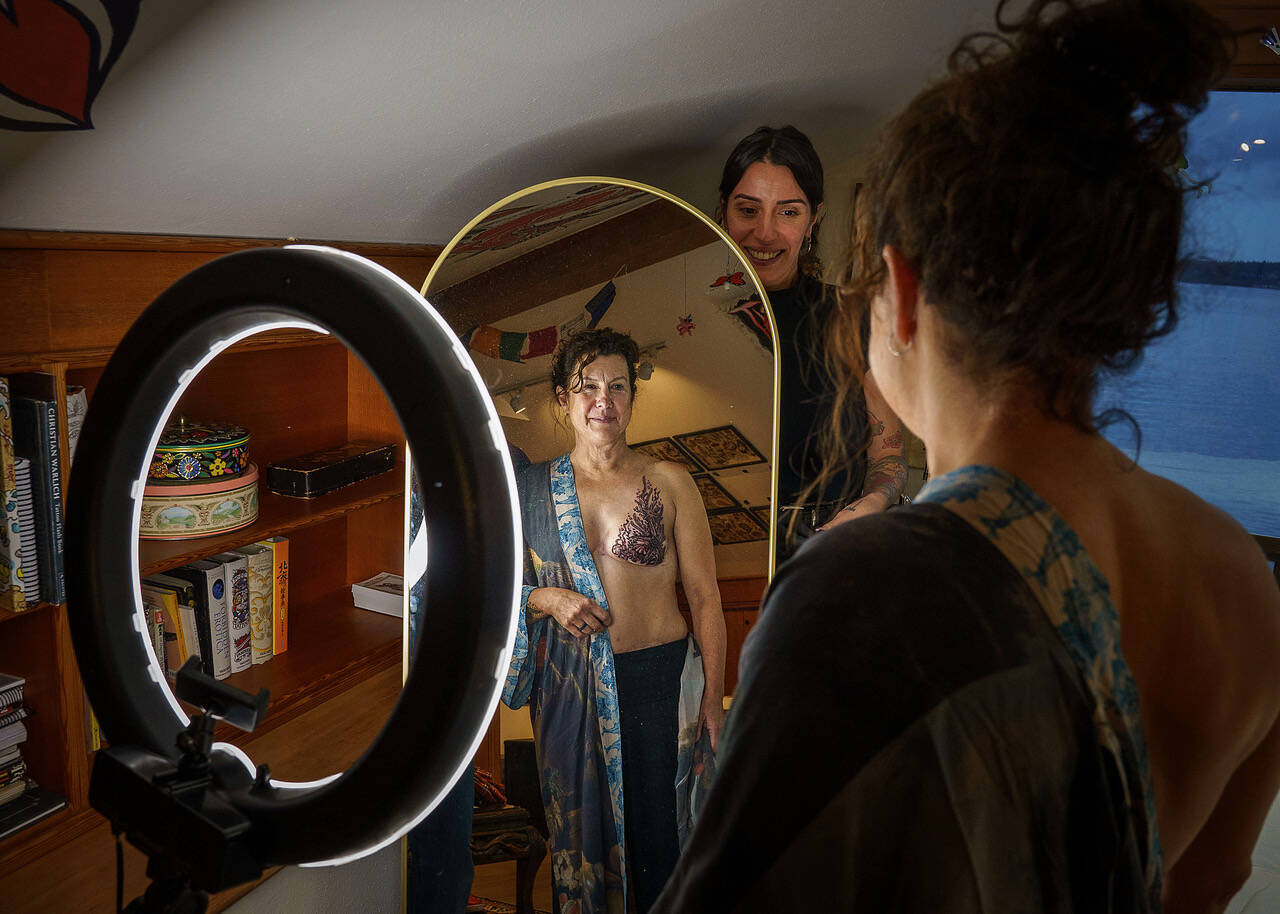After a mastectomy, looking in the mirror and seeing the scars left behind can be a jarring experience.
For breast cancer survivors, a tattoo is a meaningful and liberating way for women to reclaim their bodies after so much upheaval in their lives.
Langley tattoo artist Renata Vignati remembers the first person she provided this opportunity for healing. A shy, withdrawn woman who had had a double mastectomy flourished after receiving a tattoo of a panther and jaguar representing her two sons. She was so proud of her new ink that she often showed it off in places like the supermarket.
“It was really beautiful because I think it’s not that she changed but probably she discovered herself again,” Vignati said. “I love how much tattoos can impact people. It’s not just like the pretty drawings on people, it empowers them.”
A year and a half ago, the Argentina-born Vignati opened her studio, Black Rabbit Tattoo, on First Street in the Village by the Sea. She has traveled to over 25 countries, learning about the art and receiving tattoos from other artists she admires.
“When I started, it was very limited, all the information,” she said. “You really had to travel and find and scavenge the secrets of the trade. And now, you can (go) on your phone.”
She also grappled with the male-dominated aspect of the trade. As a young woman, she initially gave up on her dream and attended university to become a surgeon, but soon learned this path was not for her.
“I’ve always been very artistic. I didn’t know you could do a career out of art back then,” Vignati said. “People always tell you, ‘Oh, you want to be an artist, you’re going to starve your (whole) life.’ And that’s what I thought.”
In her 20s, she found her way back to tattooing thanks to a high school friend and has been fascinated by the medium ever since. She moved to the island in 2022 and decided to name her own studio after the black rabbit she spotted during her first visit to Langley.
When South Whidbey resident Teresa “TJ” Forsyth received reconstructive surgery in 2020 following a mastectomy to treat her ductal carcinoma in situ – an early form of breast cancer – she knew she wanted to do something creative with the blank slate.
Though her surgeon suggested getting a tattoo of a nipple, Forsyth didn’t want to pretend like the cancer had never happened.
An open water swimmer and the race director for the Whidbey Adventure Swim, Forsyth turned her attention towards the sea. The first time back in the water since her mastectomy, at Robinson Beach in Freeland, she encountered a gorgeous blue starfish that welcomed her back to the waves. The echinoderm symbolized more than her marine return.
“Starfish are amazing because they can lose a leg and grow it back,” Forsyth said. “There’s a lot of regenerating and new life.”
Forsyth, who had previously gotten inked by Vignati, approached the artist with her new idea. Vignati created a vibrant underwater design centered around the starfish, which she recently showed Forsyth before her tattoo appointment.
A few days later, nestled in the eaves of a building facing the slate-gray waters of the Salish Sea, Vignati’s studio was lit with a soft glow as she methodically tattooed Forsyth’s reconstructed breast.
“I looked in the mirror and I just teared up,” Forsyth said. “I’ve always been proud of my scars, ‘cause I’m here because of them, and I earned them, I feel like it. Also it was the first time I looked at it and it didn’t look gory, it didn’t look grisly. It was like, wow, this is art.”
Tattoos have remained a way for women to take control of their bodies, from indigenous cultures around the world to female sideshow performers of the Victorian era, according to articles from Smithsonian Magazine and Time.
Vignati’s art style can best be described as classic, rooted in traditional tattoo design but with her own twist. Pin-up girls with whorling, swirling hair become mermaids with glistening tails, riders on the backs of wolves and in one case, an astronaut in a mural for a Freeland coffee shop. They are unashamed to bare their bodies, often accompanied by animals, botanicals or both.
“The fact that I found her, I don’t think that’s a coincidence at all,” Forsyth said of Vignati. “That was meant to be.”
As Vignati filled in the shading – the last part of Forsyth’s tattoo – a large pod of southern resident orcas swam by, which felt like an omen.
After nearly three hours, Forsyth stood before the mirror once again, speechless at the sight of her new ink. Vignati quietly looked on; a dry eye was hard to come by in the room.
“It kind of feels like the end of the chapter,” Forsyth said. “Finally, this is the finishing touch.”
To book an appointment with Vignati, visit ablackrabbitstudio.com.



